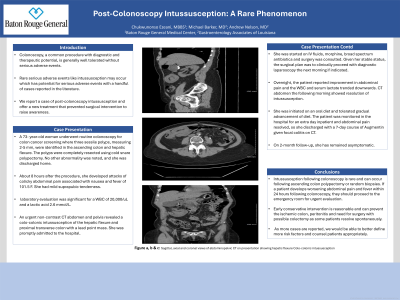Tuesday Poster Session
Category: Colon
P3774 - Post-Colonoscopy Intussusception: A Rare Phenomenon
Tuesday, October 29, 2024
10:30 AM - 4:00 PM ET
Location: Exhibit Hall E


Chukwunonso Ezeani, MBBS
Baton Rouge General Medical Center
Baton Rouge, LA
Presenting Author(s)
Chukwunonso Ezeani, MBBS1, Michael Barker, MD2, Andrew C. Nelson, MD2
1Baton Rouge General Medical Center, Baton Rouge, LA; 2Gastroenterology Associates, Baton Rouge, LA
Introduction: Colonoscopy, a common procedure with diagnostic and therapeutic potential, is generally well tolerated with minimal risk. Rare serious adverse events like intussusception may occur which has potential for serious adverse events with a handful of cases reported in the literature. We report a case of post-colonoscopy intussusception and offer a treatment approach that avoided surgical intervention to raise awareness among physicians.
Case Description/Methods: A 73- year-old woman underwent routine colonoscopy for colon cancer screening where three sessile polyps, measuring 2-5 mm, were identified in the ascending colon and hepatic flexure. The polyps were completely resected using cold snare polypectomy. No other abnormality was noted and she was discharged home.
About 8 hours after the procedure, she developed attacks of colicky abdominal pain associated with nausea and fever of 101.5 F. She had mild suprapubic tenderness, laboratory evaluation was significant for a WBC of 20,000/uL and a lactic acid 2.6 mmol/L. An urgent non-contrast CT abdomen and pelvis revealed a colo-colonic intussusception of the hepatic flexure and proximal transverse colon with a lead point mass. She was promptly admitted to the hospital. She was started on IV fluids, morphine, broad spectrum antibiotics and surgery was consulted. Given her stable status, the surgical plan was to clinically proceed with diagnostic laparoscopy the next morning if indicated.
Overnight, the patient reported improvement in abdominal pain and the WBC and serum lactate trended downwards. CT abdomen the following morning showed resolution of intussusception. She was initiated on an oral diet and tolerated gradual advancement of diet. The patient was monitored in the hospital for an extra day inpatient and abdominal pain resolved, so she discharged with a 7-day course of Augmentin given focal colitis on CT. On 2-month follow-up, she has remained asymptomatic.
Discussion: Intussusception following colonoscopy is rare and can occur following ascending colon polypectomy or random biopsies. If a patient develops worsening abdominal pain and fever within 24 hours following colonoscopy, they should proceed to the emergency room for urgent evaluation. Early conservative intervention is reasonable and can prevent the ischemic colon, peritonitis and need for surgery with possible colectomy as some patients resolve spontaneously. As more cases are reported, we would be able to better define more risk factors and counsel patients appropriately.

Disclosures:
Chukwunonso Ezeani, MBBS1, Michael Barker, MD2, Andrew C. Nelson, MD2. P3774 - Post-Colonoscopy Intussusception: A Rare Phenomenon, ACG 2024 Annual Scientific Meeting Abstracts. Philadelphia, PA: American College of Gastroenterology.
1Baton Rouge General Medical Center, Baton Rouge, LA; 2Gastroenterology Associates, Baton Rouge, LA
Introduction: Colonoscopy, a common procedure with diagnostic and therapeutic potential, is generally well tolerated with minimal risk. Rare serious adverse events like intussusception may occur which has potential for serious adverse events with a handful of cases reported in the literature. We report a case of post-colonoscopy intussusception and offer a treatment approach that avoided surgical intervention to raise awareness among physicians.
Case Description/Methods: A 73- year-old woman underwent routine colonoscopy for colon cancer screening where three sessile polyps, measuring 2-5 mm, were identified in the ascending colon and hepatic flexure. The polyps were completely resected using cold snare polypectomy. No other abnormality was noted and she was discharged home.
About 8 hours after the procedure, she developed attacks of colicky abdominal pain associated with nausea and fever of 101.5 F. She had mild suprapubic tenderness, laboratory evaluation was significant for a WBC of 20,000/uL and a lactic acid 2.6 mmol/L. An urgent non-contrast CT abdomen and pelvis revealed a colo-colonic intussusception of the hepatic flexure and proximal transverse colon with a lead point mass. She was promptly admitted to the hospital. She was started on IV fluids, morphine, broad spectrum antibiotics and surgery was consulted. Given her stable status, the surgical plan was to clinically proceed with diagnostic laparoscopy the next morning if indicated.
Overnight, the patient reported improvement in abdominal pain and the WBC and serum lactate trended downwards. CT abdomen the following morning showed resolution of intussusception. She was initiated on an oral diet and tolerated gradual advancement of diet. The patient was monitored in the hospital for an extra day inpatient and abdominal pain resolved, so she discharged with a 7-day course of Augmentin given focal colitis on CT. On 2-month follow-up, she has remained asymptomatic.
Discussion: Intussusception following colonoscopy is rare and can occur following ascending colon polypectomy or random biopsies. If a patient develops worsening abdominal pain and fever within 24 hours following colonoscopy, they should proceed to the emergency room for urgent evaluation. Early conservative intervention is reasonable and can prevent the ischemic colon, peritonitis and need for surgery with possible colectomy as some patients resolve spontaneously. As more cases are reported, we would be able to better define more risk factors and counsel patients appropriately.

Figure: Abdominopelvic Computed tomography (CT) on presentation showing colo-colonic intussusception (white arrow) on axial (A), coronal (B) and sagittal (C) views as well as repeat CT the following day showing resolution-red arrow (D).
Disclosures:
Chukwunonso Ezeani indicated no relevant financial relationships.
Michael Barker indicated no relevant financial relationships.
Andrew Nelson indicated no relevant financial relationships.
Chukwunonso Ezeani, MBBS1, Michael Barker, MD2, Andrew C. Nelson, MD2. P3774 - Post-Colonoscopy Intussusception: A Rare Phenomenon, ACG 2024 Annual Scientific Meeting Abstracts. Philadelphia, PA: American College of Gastroenterology.
